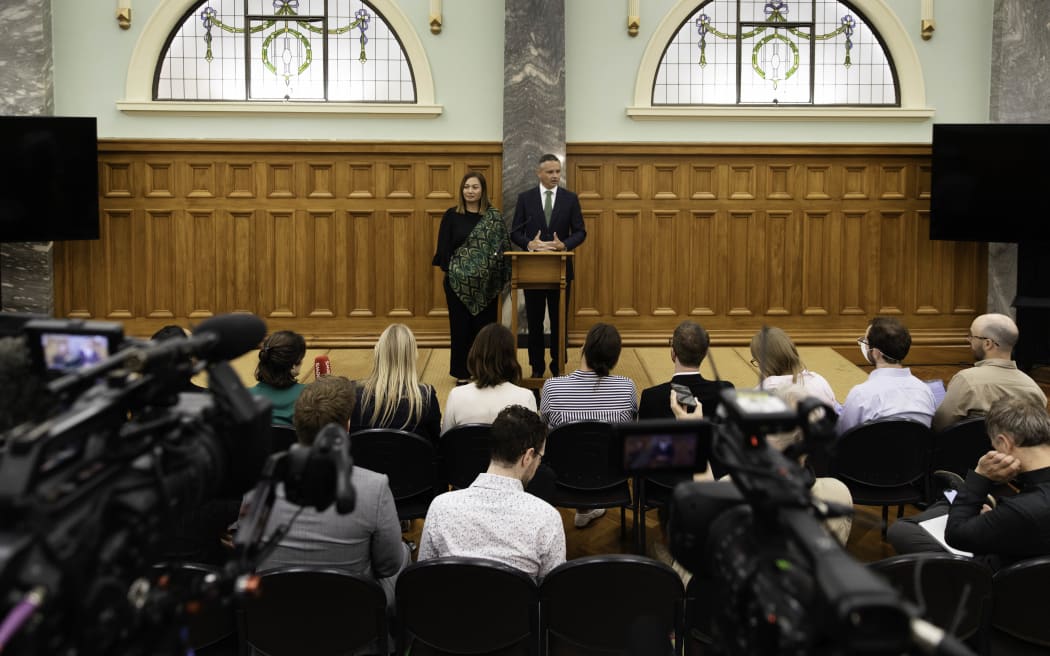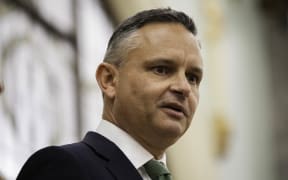Power Play - No one should be shocked by James Shaw calling time on the leadership given his repeated hints his commitment lasted only till he'd led the Greens "safely out the other side" of government.
But while the Green Party has certainly reached the other side and is now settling back into opposition, one might question just how safely it has landed.
In his media conference, Shaw talked up the caucus' health, describing it as stable and in "great shape".
But the success of its 2023 campaign hides some serious vulnerabilities, not helped by fellow co-leader Marama Davidson refusing to guarantee she too won't step down before the election.
Numbering 15 MPs, the team is its largest ever but also largely inexperienced. Following Shaw's exit from Parliament, two-thirds will be fresh-faced first-timers and just Davidson and Julie Anne Genter will have any experience of sitting in opposition.
The caucus is still reeling from the sudden resignation of justice spokesperson Golriz Ghahraman this month after shop-lifting allegations, and the party now faces a potentially turbulent leadership process.

James Shaw, right, announces his resignation as Green Party co-leader at a media conference with co-leader Marama Davidson at Parliament on 30 January 2024. Photo: RNZ / Angus Dreaver
Shaw's clear signalling has given the party time to prepare something of a succession plan, but there will inevitably be competing opinions within the caucus and wider membership about who should take over.
And although outsiders may regard Chlöe Swarbrick as the obvious successor, Shaw's own experience in the top job shows the membership can be an unpredictable bunch.
A tumultuous tenure
Shaw's tenure has been a tumultuous one from early on: just two years into the job and weeks out from the 2017 election, Metiria Turei's sudden resignation left him alone at the tiller as the party's sole co-leader.
Facing the genuine threat of electoral oblivion, Shaw instead steadied the ship and steered the Greens into government for the first time ever.
He assumed the role of Climate Minister outside Cabinet and achieved concrete change, overhauling the emissions trading scheme and successfully shepherding the Zero Carbon Act through Parliament with near-unanimous support.
Shaw proved himself to be the Greens' most effective performer, working across the aisle to secure the backing of unlikely allies, winning respect and even friendship from some in National and New Zealand First.
Senior business voices regularly ranked him among the top Ministerial performers in the Herald's Mood of the Boardroom.
His performance in the role so impressed that he was reappointed in 2020, despite Labour not needing the Green Party's support to govern.
That same consensus-building approach, though, won him fierce criticism from within the Greens' ranks.
Former MPs Sue Bradford and Catherine Delahunty were frequent critics of Shaw's willingness to compromise, describing him as weak on climate issues.
Shaw also lost favour during the 2020 campaign after a foolish misjudgment to greenlight taxpayer funding for the private and pricey Green School in Taranaki, against his party's policy.
A shock vote in 2022 saw Shaw temporarily ousted from the leadership by a disgruntled minority of the membership through a quirk of the Greens' rulebook.
The aggrieved faction, though, had no alternative leader standing in the wings and Shaw was re-elected unopposed two months later with 97 percent of the vote.
Shaw resolved to reaquaint himself with the membership but was clearly shaken by the experience.
When the Wellington Central race became competitive following the incumbent Grant Robertson's decision to pull out, Shaw soon followed suit, leaving the seat for Tamatha Paul to contest and ultimately win.
Some saw the manuevoure as a sign of more internal ructions against Shaw, but more likely it was a calculated call in anticipation of a change in government, removing the need for a by-election in case of an exit. The same reason holds true for Robertson, for that matter.
The search for a successor
Shaw has tempered the risks of instability to the party by resolving to stay in Parliament for at least a few more months to usher through his member's bill, and he has offered his services as mentor to the newbie MPs.
Those risks are not insignificant though as the party embarks on a leadership process former Prime Minister Jacinda Ardern once compared to Squid Game.
Nominations will open tomorrow and close in two weeks. Members will attend local meetings and vote, with a new co-leader to be announced on 10 March.
Whoever is successful will have to help lead a caucus full of new personalities with strong ideas and near no experience of opposition or even Parliament.
Ghahraman's exit and Elizabeth Kerekere's last year show how quickly a career can unravel and a party's brand be damaged.
The party's rules were changed in 2022, removing the requirement for a male co-leader. Instead members voted to mandate one female leader and one leader of any gender. One leader must also be Māori.
As Davidson meets both the female and Māori criteria, the vacancy can be filled by any Green member, in or out of Parliament.
The obvious contender to take over, if she's amenable, is Auckland Central MP Chlöe Swarbrick. Swarbrick has previously denied leadership ambitions but so too did Ardern before her ascension.
Articulate and passionate, Swarbrick commands the highest profile of all Green MPs, regularly registering in preferred prime minister polls ahead of the party's co-leaders.
She is a proven winner, defying the odds to win the Auckland Central seat in 2020 and then again in 2023 - the first Green MP ever to hold on to a seat for more than one term.
That said, not all in the caucus are enamoured by Swarbrick's approach or popularity, nor a section of the membership who consider her insufficiently radical.
Some of those who criticised Shaw for what they considered tepidity see Swarbrick as fitting a similar middle-class mould.
Other contenders could include previous hopeful Julie Anne Genter, or Teanau Tuiono who publicly contemplated a tilt during the brief vacancy of 2022.
The Greens' membership has proven itself to be unpredictable before, selecting Shaw ahead of the far more experienced Kevin Hague in 2015, and Metiria Turei ahead of veteran Sue Bradford in 2009.
In his media conference, Shaw backed members' capability to choose his successor, saying they tended to make "sensible, well-considered decisions", perhaps momentarily forgetting his temporary ouster.
Let the Squid Game begin.



